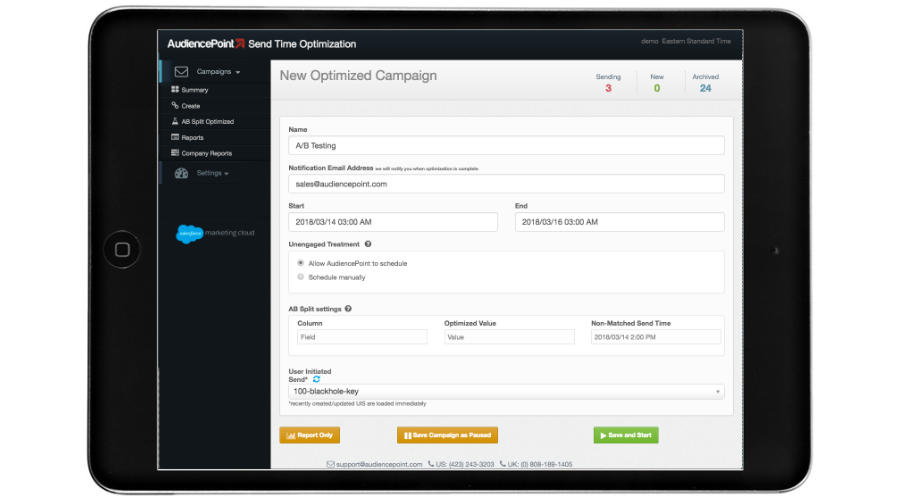AudiencePoint is thrilled to announce our new integration with Klaviyo! AudiencePoint is looking for partners to pilot our...
Does DKIM Help with Deliverability?
Email authenticity is a cornerstone of successful digital marketing strategies, especially when it comes to deliverability. One technological tool that aids in this process is DomainKeys Identified Mail or DKIM. At its core, DKIM adds a digital signature to each email, effectively telling the recipient’s server, ‘This email is genuinely from us and hasn’t been tampered with.’ This mechanism not only helps reinforce trust with internet service providers (ISPs) but significantly enhances your email’s chances of dodging the dreaded spam folder.
For email marketers, adopting DKIM can greatly impact email deliverability and inbox placement. With so much email traffic flagged daily as spam, maintaining a streamlined pathway to your recipient’s inbox is vital. Proper implementation of DKIM acts as proof of authenticity and credibility, which ISPs take into account when deciding if your message should land in the primary inbox or the spam folder. Moreover, leveraging tools like a DKIM checker ensures that your setup is correctly maintained, further bolstering deliverability.
Importance of Aligning DKIM with SPF and DMARC
Ensuring that DKIM is aligned with other email authentication protocols, such as SPF (Sender Policy Framework) and DMARC (Domain-based Message Authentication, Reporting, and Conformance), adds another layer of protection. This triumvirate of authentication protocols works in synergy to provide a holistic defense system against spam and spoofing. For businesses utilizing digital marketing channels, integrating these protocols can optimize their authenticity, which, in turn, supports better deliverability.
Common Deliverability Issues Resolved by DKIM
Several common deliverability issues can be resolved by integrating DKIM into your email strategy. Some of these include avoiding ISP blocks, reducing the risk of messages being marked as spam, improving trust among email recipients, and ultimately safeguarding your brand’s reputation. Adopting DKIM and frequently using a DKIM checker can ensure your emails are not filtered out, thus maintaining a robust and reliable communication channel with your audience.
Does DKIM Prevent Email Spoofing?
Understanding Email Spoofing and Its Impact
In the digital communication landscape, email spoofing is a prevalent threat where the sender’s email address appears to be from a legitimate source. This deceptive practice can lead to phishing scams, data breaches, and erosion of consumer trust. For email marketers and digital marketing professionals, tackling such security vulnerabilities is crucial to maintaining brand integrity and ensuring messages reach their intended audience.
Mechanisms of DKIM in Preventing Spoofing
DKIM (DomainKeys Identified Mail) plays a pivotal role in curbing email spoofing. It does this by using cryptographic authentication of the sender’s domain, linking a digital signature to outgoing emails. When an email is sent, DKIM generates a unique signature header that is attached to the email. Receiving servers verify the signature with the sender’s DNS record, confirming the email’s integrity and authenticity, effectively preventing tampering or impersonation.
Comparison with SPF and DMARC in Preventing Spoofing
While DKIM focuses on verifying the authenticity of the content and sender domain, SPF (Sender Policy Framework) checks that the email is sent from a server authorized to send emails for that domain. DMARC (Domain-based Message Authentication, Reporting & Conformance) builds on DKIM and SPF, providing alignment and reporting capabilities. Together, they create a robust security posture against spoofing, protecting brand reputation and consumer trust.
Real-world Examples of DKIM in Action Against Spoofing
Many companies have successfully implemented DKIM to safeguard their brands from spoofing. For instance, major email services like Gmail and Office 365 rely on DKIM to validate email authenticity. Companies leveraging AudiencePoint’s expertise can enhance their deliverability while minimizing the risks of email spoofing. Our robust tools provide seamless setup and integration of DKIM, easing the burden on technical implementation and enhancing email security.
What Are the Benefits of DKIM?
Implementing DKIM (DomainKeys Identified Mail) offers multiple benefits that extend beyond mere technicalities—it’s a vital component in enhancing the authenticity and credibility of your marketing emails. One significant advantage is its ability to boost email credibility and brand reputation. When emails are signed with DKIM, they carry a signature that verifies the email’s source, providing assurance to ISPs and recipients that the emails truly come from your domain. This assurance translates to a higher trust rate and can significantly improve your sender’s reputation score.
Enhancement of Email Security Features
DKIM is a critical player in boosting your email security features. It helps in securing the integrity of an email’s content, as it allows the recipient to verify whether the headers and message have been altered during transit. With cyber threats at an all-time high, incorporating DKIM becomes a necessity for safeguarding not just the content but also the reputation of businesses that rely heavily on email marketing as a strategic tool.
Alignment with Industry Best Practices
Another important benefit of implementing DKIM is its alignment with industry best practices. As most successful brands strive to maintain stringent email authentication standards, using DKIM demonstrates a commitment to following these industry-leading protocols. This commitment can lead to improved deliverability and open rates as mailbox providers see consistency in adhering to best practices.
In addition to immediate gains, DKIM supports long-term benefits for marketing and outreach efforts. Ensuring that your email campaigns reach the intended audience without being flagged as spam helps maintain and grow your brand’s presence in the inbox. Over time, this reliability fosters trust and engagement among your subscribers, leading to higher conversion rates and stronger audience relationships.
Does DKIM Reduce Spam?
Role of DKIM in Reducing Spam
The implementation of DKIM plays a crucial role in reducing spam. By attaching a digital signature to each outgoing email, DKIM ensures that the message is indeed sent from the domain it claims to be from. This cryptographic authentication process works by verifying that the content of the email has not been altered in transit, which is key in identifying and mitigating spam. With DKIM, your emails are less likely to be intercepted and modified by malicious actors, reducing their chances of ending up in the recipient’s spam folder.
The Synergy of DKIM with Other Email Authentication Methods
While DKIM provides significant benefits on its own, its effectiveness in spam reduction is amplified when used alongside other email authentication methods like SPF (Sender Policy Framework) and DMARC (Domain-based Message Authentication Reporting & Conformance). These protocols work in harmony to create a robust authentication framework. DKIM verifies the integrity of the email content, while SPF verifies that the sender’s IP address is authorized to send emails from that domain. DMARC ties these protocols together, adding an extra layer of security by defining how email providers should handle emails that fail SPF or DKIM checks. This synergy significantly enhances the protection against spam and phishing attacks.
Impact of DKIM on ISP Spam Filters
Internet Service Providers (ISPs) utilize sophisticated spam filters to determine the legitimacy of incoming emails. Implementing DKIM impacts these spam filters by signaling that the email’s source is credible and verified, improving its chances of landing in the inbox rather than the spam folder. DKIM’s authentication process contributes to building a positive sender reputation with ISPs, which is a major factor in achieving high deliverability rates.
Statistical Evidence of Spam Reduction with DKIM
Numerous studies and reports have shown that organizations implementing DKIM experience a noticeable decrease in the volume of spam and phishing attacks. By verifying message integrity, DKIM aids in maintaining a clean email ecosystem and enhances delivery success. Organizations that have integrated DKIM into their email systems often report reduced spam complaints and improved response rates from their subscribers, as their emails are more trusted by both ISPs and recipients. Contact AudiencePoint today!





